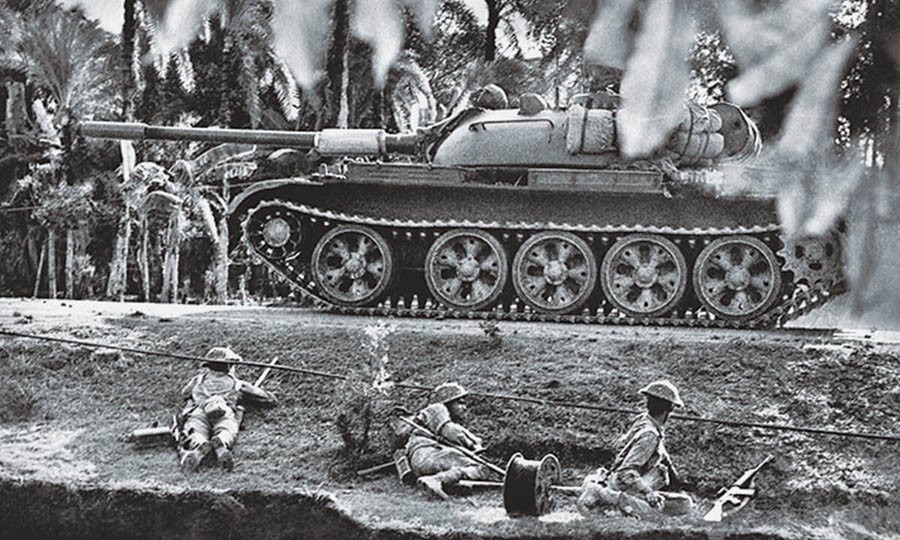

The arrival of December every year sends us a grim reminder of what happened in 1971 and invites us to introspect a bit intensely over that sad event of our political life.
Sadly however, introspection is what we tend not to indulge in. The secession of East Pakistan was a tragic occurrence and equally tragic is the fact that Pakistan figures as a diabolical other in Bangladeshi bid to construct its distinct identity as an independent nation state.
Thus far, the analysis of events culminating in the breakup of Pakistan is facile and cursory for want of proper information. Therefore, the narrative put together on that particular subject, circulated widely among the international academic circles, is devoid of solid and well-woven Pakistani representation.
But this balking of Pakistani academics to anatomise the dissolution of Pakistan, just after 23 years of its coming into existence, restrains us from taking stock of ourselves in an objective manner. To concede the omissions and commissions perpetrated against the East Pakistanis in the days of our shared history, along with a demonstration of the resolve that these will not be repeated, should be emphasised.
By going through that route only, the people and the state representing them may evolve into more responsible socio-political entities. That also will set odd conjectures and conspiracy theories, which provides quite a blurred view about the Bengalis, at rest. Accepting responsibility for anything having gone wrong, instead of shoving it under the carpet, is the trait of mature nations endowed with courage and self-confidence.
If at all any analysis is advanced on that particular subject, it is stained and sullied with simplistic and skewed conclusions. Conspiratorial Hindu community(many of them teachers who misled the Bengali youth), far too many seditious elements within the East Pakistanis including MuktiBahni operatives and Indian machinations to dismember Pakistan were the factors deemed crucial in the Pakistani popular analysis of that event.
In fact, according to the state-driven narrative, all the travails and tragedies befalling Pakistan are propelled from outside. Inability of our political leadership to forge consensus in matters of national importance, failure to establish democratic ethos in the initial years of Pakistan, foregrounding the religious meta-narrative over ethnic, cultural, linguistic and economic disparities have yet to find space in the popular perception of the event.
Travesties of oligarchic setup (with landed elite in the garb of politicians, bureaucrats and Ayub Khan as representing the interests of Army) in the 1950s have scantily been investigated. The overall bearing of the way oligarchy functioned, in a unilateral manner, over East Pakistani eventually resulted in their complete estrangement with Punjabis in particular. Increased centralisation of power in the hands of a few hardly corresponded to a society consisting of cultural and social multiplicity.
In his book Friends not Masters, General Ayub Khan exhibits a succinct distaste for Bengalis and did not like when posted to that area. Jogendra Nath Mandal’s letter to the Prime Minister provides us clear testimony to the highhandedness of the West Pakistani state officials not only towards Bengali Dalits but to the Bengalis in general. That letter is available online and is worthy of careful reading for all students of history and political studies. Similarly the hurried manner in which the Objectives Resolution was pushed and passed exacerbated the majority-minority dichotomy since the minority living in the Eastern wing felt disenfranchised and therefore alienated.
It also points at our inability to cultivate the plural values, underscored earlier by the founder of Pakistan in the 11th August speech.
During the initial years, Pakistan was seen as essentially the realisation of the political aspirations of North Indian Muslims. From political leaders to academic elite and even Islamic scholars, North India had over-representation. The most influential ulema like Shabbir Ahmed Usmani, Zafar Ahmed Ansari and Salman Nadwi belonged to North India. Even the Islamic narrative, having currency and official support in Pakistan, had its origin in North India. Indigenous traditions, customs and social ethos were derided, which had a trenchant reaction in East Pakistan.
It was in the 1960s that Punjabi bourgeois started asserting itself; thus, it gradually started displacing the migrants from North India. More importantly in a country as diverse as Pakistan was in pre-1971 era, not only democratic dispensation was indispensable but also the monolithic ideology whether religious or otherwise proved inimical as history has proven.
Even in the present day Pakistan, diversity ought to be celebrated instead of feared. The system of governance has to be flexible enough to accommodate diverse ethnic and lingual groups and factions. While keeping the East Pakistan tragedy in view, the entitlement and rights not only of every individual but of all the factions and groups inhabiting Pakistan must be honoured and respected.
A few weeks back, I wrote a column on the Kissan conference, held in 1970 at Toba Tek Singh and alluded to the staggering number of peasants congregated there. While concluding the piece, I underlined the significance of ‘class’ as a category which may help us to forge harmony among the polarised sections of Pakistani society. If not, religious division and ethnic fault lines are likely to accentuate divisive tendencies that are showing in a very pronounced way.
I still wonder how with that class solidarity, exhibited by the Pakistani peasantry at Toba, ethnic and racial differences cut the polity asunder within 20 months. That point needs to be debated by Pakistani academics and the members of intelligentsia as the only possible way to ensure unity among Pakistanis. I earnestly believe, invocation of class as the category of social analysis may provide us with the prognosis as to how to preclude an event like 1971.